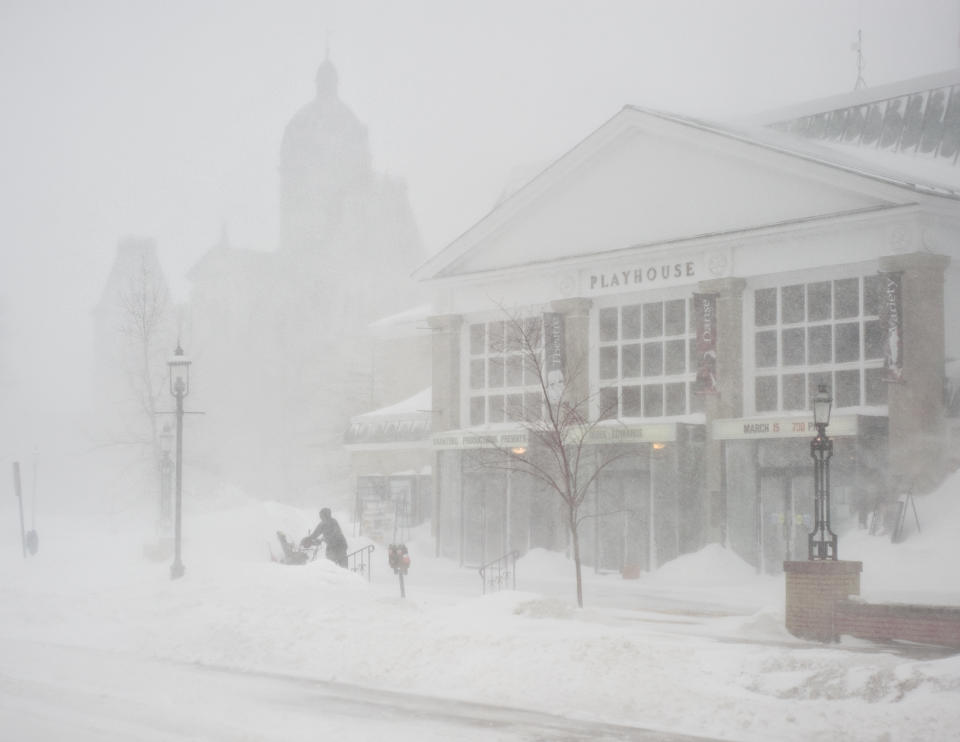'December-like' temperatures on the way in Canada, and no one is spared
Say hello to winter Canada! Much of the country is going to experience a storm pattern in the next 24 to 48 hours.
Newfoundland
Currently, Newfoundland has gotten the brunt of the severe weather, with extreme winds and accumulating snow. According to Brett Anderson, senior meteorologist with AccuWeather, the St. John’s area has seen steady, constant winds at 75 km/h with wind gusts exceeding 100 km/h.
“St. John’s…it’s felt almost like a constant tropical storm there in terms of wind,” Anderson said. “They’ve had this very powerful ocean storm just to the north, across northern Newfoundland…”
Much of Newfoundland has been stuck in the windstorm because the storm is moving so slowly.
Fortunately, the impressively strong winds are expected to wind down with a much calmer day expected tomorrow.
“That big storm is going to start moving away here by this evening, so winds should really start to come down,” Anderson said. “
Siding getting taken right off the house in St. John's. #nlwx @VOCMNEWS @weathernetwork pic.twitter.com/Eip6V5a0qp
— Peter Lynch (@plynch2007) November 15, 2018
I’m fairly sure there was a fence there this morning. #nlwx pic.twitter.com/Erj64WhPxc
— Jeff Ducharme (@hirider750) November 15, 2018
The wind has claimed a victim in our parking lot. #nlwx #nltraffic pic.twitter.com/Ib49vPBloD
— Earl Noble (@Noble41) November 15, 2018
It's a little blustery out right now in Gander. Winds aren't crazy bad, but will probably be worse later this morning. #nlwx pic.twitter.com/17DsM4mArf
— Justin Boudreau (@Isotachtics) November 15, 2018
But there is another storm coming through Eastern Canada that might result in some mixed precipitation in the Maritimes.
Ontario
The storm is going to bring snow to the Greater Toronto Area Thursday afternoon, with the most severe conditions focused on New York. Around Toronto, residents should expect around 2 to 8 cm of snow to pile up, with 8 to 10 cm expected northwest of the city.
“Mostly going to be light to moderate snow,” Anderson said. “Snow should let up probably around early morning hours, about three in the morning or so, as the storm quickly lifts out and away.”
Anderson also identified that there will be some lake effect snow around the typical snow belt in Ontario on Friday.
Our latest storm snow/sleet accumulation forecast with estimated precipitation arrival times. #AccuWeather pic.twitter.com/uUkOouXJkz
— Brett Anderson (@BrettAWX) November 14, 2018
If you have the option of starting your GTA PM commute earlier rather than later, I definitely would head out early. Road conditions will deteriorate between 4 & 6pm with slushy and slippery roads thru the evening & overnight. Plan for a slower Friday morning commute as well pic.twitter.com/ETwbcMR4G7
— Doug Gillham (@gtaweather1) November 15, 2018
Around Ottawa, between 8 and 12 cm of snow is expected the fall in the area on Thursday. Moving east, 8 to 15 cm of snow expected in the Montreal area.
When it comes to temperatures, Anderson said Ontario and Quebec are will be colder than normal. Temperatures around Toronto will be around 0 C during the snowfall, dropping to -1 C or -2 C in the evening and moving up to 3 C or 4 C on Friday. Ottawa is expected to be a bit colder, reaching -6 C in the evening and -2 C on Friday.

Opposite forecasts for the East and West
This same pattern will also hit the Maritimes quite significantly, following the previous storm. According to Anderson, central and northern New Brunswick will see the most snow, totaling 15 – 25 cm on Friday.
Nova Scotia will see mixed precipitation late Thursday night, transitioning to rain on Friday. But the northern portion of the province, moving into Prince Edward Island and southern New Brunswick, is expected to get sustained period of sleet, freezing rain and snow, which will create hazardous travel conditions on Friday.
If you’re in the western portion of Canada, the weather patterns look to be more relaxed. According to Anderson, Alberta will see a storm system that will bring approximately 30 cm of snow in the mountains, decreasing to 2 cm of snow around Edmonton and 2 to 8 cm around the Calgary area Thursday into Friday. But the most populous areas of British Columbia should only expect to see some rain, no significant snowfall this time around.
Is storm relief in sight?
Moving into the forecasters have been predicting a warm up in the eastern portion of the country, from Alberta eventually moving into the Maritimes, but according to Anderson these mild temperatures are going to be less significant than initially predicted.
The AccuWeather meteorologist said this warm up is expected to only be around southern Ontario and won’t show up until the later half of next week, with the first half of the week remaining “chilly.”
“Temperatures will likely…bounce up probably slightly above normal levels across southern Ontario,” Anderson said. “It’s going to be a cold weekend across much of eastern Canada, no question about that, more like December…snow season is certainly underway.”


